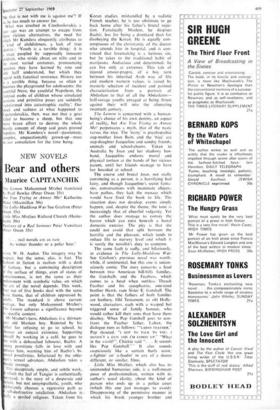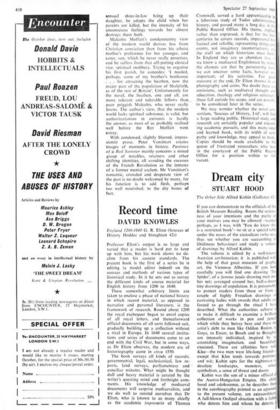NEW NOVELS
Bear and others
Maurice CAPITANCHIK The Lemon Mohammed Mrabet translated by Paul Bowles (Peter Owen 35s) 4re You Trying to Annoy Me? Katherine Blake (Macmillan 30s) The Lolly-Maddona War Sue Grafton (Peter )wen 35s) ink Miss Moffatt Richard Church (Heine- ann 30s) animes of a Red Summer Peter Vansittart Peter Owen 35s)
. . real novels are as rare As winter thunder or a polar bear.'
rote W. H. Auden. The imagery may be uspect, but the sense, alas, is fact. The ,shion in fiction is realism with a dash f fantasy, but a convincing description f the surface of things, even of states of onsciousness, is not the same as their ndowment with symbolic value, on which e art of the novel depends. This week, our out of five books deal with the same asic theme, that of children oppressed by dulls. The standard is above current verage, but only Mohammed Mrabet's he Lemon achieves a significance beyond s specific context.
Mr Mrabet's hero, Abdaslam, is a thirteen- ear old Moslem boy. Rejected by his ather for refusing to go to school, he hooses an outcast existence. Supporting rnself by working in a café, he goes to ve with a debauched labourer, Bachir. A oung prostitute falls in love with and -'uces him, warning him of Bachir's W- aal proclivities. Infuriated by the older Ws sexual advances, Abdaslam takes a body revenge. This deceptively simple, and subtle work, which the feel of Tangier is authentically ''eyed, is the story of a desperate and Tent, but not unsympathetic, youth, who eliberately chooses a regressive path as elf-destructive retaliation. Abdaslam is IlY a spoiled religious. Taken from his
Koran studies, mishandled by a sadistic French teacher, he is too obstinate to go back home after his father's brutal rejec- tion. Fanatically Moslem, he despises Bachir, less for being a drunkard than for disobeying the Koran. He is equally con- temptuous of the christianity of the doctor who attends him in hospital, and is con- vinced that lovemaking is a heinous sin, but he takes to the traditional habit of marijuana. Audacious and determined, he can live only at extremes. This tale of injured amour-propre, of a boy torn between his inherited Arab way of life and modern western values, is raised by masterly selection of incident and pointed characterisation from a portrait of Abdaslam to that of all the Abdaslams- half-savage youths enraged at being thrust against their will into the alienating twentieth century.
The Lemon is concerned with a human- being's choice of his own destiny, an aspect of reality, but Are You Trying to Annoy Me? perpetuates a myth, that of the nasty versus the nice. The 'nasty' is psychopathic step-mother Joan Bain, and the 'nice' are step-daughter Jacqueline and sundry friends. animals and school-chums. Taken to Australia by Joan and her shadowy hus- band, Jacqueline endures moral and physical torture at the hands of her vicious parent, until her friends manage to have her boarded at school.
The coarse and brutal Joan, not really convincing as a person, is a horrifying bad fairy, and though Jacqueline's secret fanta- sies, conversations with inanimate objects, have pathos, they lack the menace which would have fired the book to life. The situation does not develop, events simply happen, and, despite the theme, the tone is increasingly that of cheerful vulgarity. Yet the author does manage to convey the horror which can exist beneath a banal domestic exterior. The pity is that she could not avoid that split between the horrific and the pleasant, which tends to reduce life to nursery level and which it is surely the novelist's duty to contemn.
The same fault is sadly, and hilariously, in evidence in The Lolly-Maddona War. Sue Grafton's previous novel was worth- while, if sentimental, but this one is uncon- sciously comic. The story concerns a feud between two American hill-billy families, the Gutshalts and the Feathers, which comes to a head when ruthless Thrush Feather and his sycophantic, one-eyed brother Hawk, rape Sister E. Gutshall. The point is that the fathers of both families are leathery, Old Testament, or old Holly- wood, characters, each with a warped but triggered sense of family honour, who would rather kill their sons than have them -disobey. When Pap Gutshall goes to con- front the Feather father, Laban, the dialogue runs as follows: "LABAN FEATHER," Pap shouted. "I GOT TO TALK TO YOU. I HAVEN'T A GUN AND I'M COMIN UP." "What in the world?", Chickie said ". . . It sounds like Pap Gutshall." ' It also sounds suspiciously like a certain burly actor, a-fightin' an' a-feudin' in any of a dozen different, or similar, films.
Little Miss Moffatt, which also has its unintended humorous side, is a well-meant piece of professionalism, written with its author's usual clarity, about the kind of parson who ends up in a police court (which this one just manages to avoid). Disapproving of the permissive manner in which his brash younger brother and sensual sister-in-law bring up their daughter, he adopts the child when her parents are killed, but the intensity of his unconscious feelings towards her almost destroys them both.
Malcolm Moffatt's condemnatory view of the modern world derives less from Christian conviction than from his atheist mother's preference for her younger, and saner, son, which he never really perceives, and he suffers from that off-putting clerical vice, spiritual snobbery. Trying to organise his first parish, he concedes: 'I needed, perhaps, some of my brother's bonhomie . . . for attracting the heathen, now the major part of the population of Shalefoftl, as of the rest of Britain'. Unfortunately for the novel, the heathen, one and all, are more tolerant and tolerable fellows than poor priggish Malcolm, who never really learns. The author's view, that the modern world lacks spiritual substance, is valid, but authoritarian ism in extremis is hardly the answer, as most of us probably realised well before the Rev Moffatt went astray.
With condensed, slightly blurred, impres- sionist prose, Peter Vansittart creates
images of moments in history. Pastimes of a Red Summer mainly concerns a mixed
group of notables, retainers and other shifting identities, all avoiding the excesses of the French Revolution as the inmates of a former mental asylum. Mr Vansittart's romantic, crowded and desperate view of the past is no doubt welcomed by many, for
his function is to add flesh, perhaps too well nourished, to the dry bones of fact.







































 Previous page
Previous page